By Michael J. Totten
Last year I visited Southern Israel after the Lebanon war winded down. The Israelis were then engaged in a similar fight against the rocket launchers in Gaza. The situation in the meantime has hardly changed at all. Once again — still — Israelis are under Qassam rocket fire from Gaza and are planning an IDF operation to stop to it. The crisis, if anything, is only worse now because the rockets are even more frequent. I wrote three articles about this in August last year and I realize now they could have been written today. Here they are as they originally appeared and as relevant as they were when I wrote them.
Part I: Eyeless in Gaza
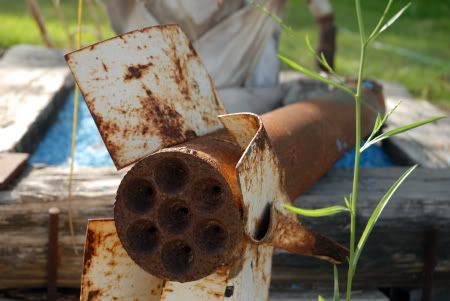
The engine of a Qassam rocket fired from Gaza into Israel by Palestinian terrorists
SOUTHERN ISRAEL, NEAR GAZA — All eyes turned from Gaza to Lebanon as Israel fought a hot war with Hezbollah across its northern border. Before the Lebanon war broke out, the fighting in and around Gaza was the big story in Israel. But once the media coverage ended it stayed ended, even after foreign correspondents were free to pick up where they left off. Perhaps the kidnapping of two Fox News journalists by the latest in a long line of Palestinian terrorist groups — the Holy Jihad Brigades — all but guaranteed reporters wouldn’t go back.
Even though I’ve been in Israel for a couple of weeks, I still didn’t know any more about what’s going on down there than people who have never been here before. News from Israel’s other rocket war barely trickles up to Tel Aviv. So I hopped in my rental car and drove down to Mishav Klahim, just east of Netivot and 20 kilometers from Gaza, to meet Shika Frista who promised to show me what’s going on.
I missed a turn on the coastal road when I was supposed to veer left to avoid driving straight into Gaza. Suddenly mine was the only car on the road. An aerial surveillance balloon hovered in the air up ahead. It looked just like the one I saw flying on the border with Lebanon while Hezbollah fired barrages of Katyusha rockets into Israeli cities.
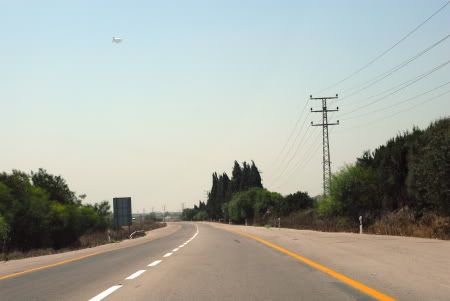
The war of the rockets was supposed to be over. But I was back in it.
The left turn I needed to take was behind me. But I kept driving, slowly, so I could see what was ahead. I rolled down the window and listened for sounds of war. All was quiet, oppressively hot, and still.
The road dead-ends at the Erez Crossing Point. No one was going in or out of Gaza that day. It looked like no one was even there working or watching, like the place had been abandoned and left to itself.
I took a quick picture…
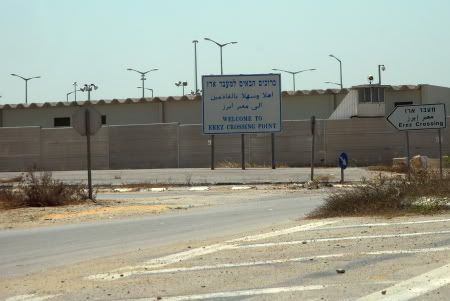
…then turned the car around and realized I had made a mistake. Any Israeli military personnel who watched me drive up, take a quick picture, and leave right away would have good reason to be suspicious and even arrest me. But no cars followed in the rear view mirror.
The map led me straight to Shika Frista’s house on his Moshav. We sat at little table under the shade of palm trees next to his swimming pool.
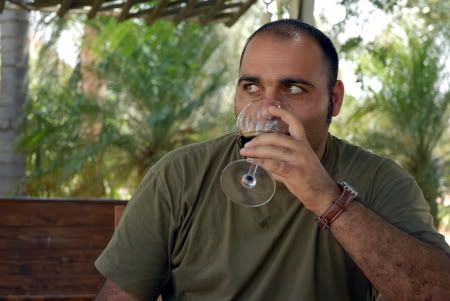
Shika drank a glass of red wine.
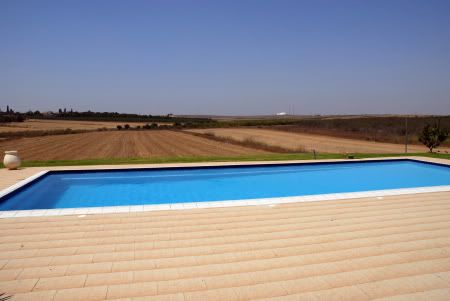
It was too hot for wine, so I asked for a beer. The air outside is drier in the south, though, not humid and heavy like it is in Tel Aviv.
“I can hear the Qassam rockets fired at us from Gaza,” he said and gestured to the farmland beyond. “They shake the windows of my house when they hit.”
Israel ended up with two rocket wars at the same time. One in the north, and one in the south. Unlike Hezbollah’s arsenal, Qassam rockets aren’t made in Iran. They’re made in Gaza itself. They’re smaller, though, than Katyushas. The south has not been evacuated like the north was, even though people still occasionally are killed by the rockets.
“How often does Hamas fire rockets?” I said.
“Hamas doesn’t shoot them,” he said. “Islamic Jihad shoots them.”
“How close to your house has a Qassam hit?” I said.
“About…four or five kilometers away,” he said.
“And you can hear them here,” I said, “even from that far away?”
“Oh,” he said. “Of course.”
We finished our drinks and drove toward Gaza in his truck.
“Ariel Sharon’s farm is near here, right?” I said.
“Yeah,” he said. “A Qassam landed twenty meters from his wife’s grave on the family property.”
We passed Sharon’s farm and in minutes reached the city of Sderot.
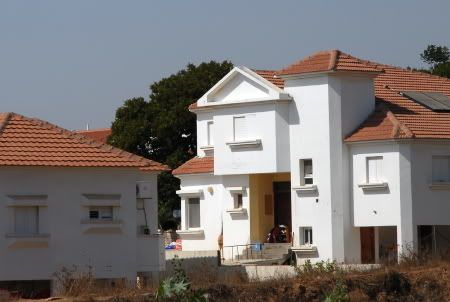
“Lots of Qassams hit this city,” Shika said. “Most people killed by the Qassams live here.”
“How many rockets are hitting the city right now?” I said.
“Not as many today,” he said. “Because of the war in Lebanon.”
“What does Lebanon have to do with it?” I said.
“All the journalists forgot about us during the Lebanon war. So the terrorists are waiting for the media to come back before firing rockets again. They don’t want to waste those they have.”
“That can’t be the only reason,” I said. “The IDF has been active in Gaza this entire time. Surely that has something to do with it.”
“Yes,” he said. “Also because of the IDF.”
Later two more Israelis repeated what Shika said about Hamas and Islamic Jihad cooling their rocket launchers while the media’s attention was elsewhere. I haven’t heard any official confirmation from either side that it’s true.
“How long do people here have from the time they hear an air raid siren until the rockets land?” I said.
“About 20 seconds,” he said.
We reached a small IDF base near the Israeli town of Nir Am where Shika’s friend Zvika waited for us.
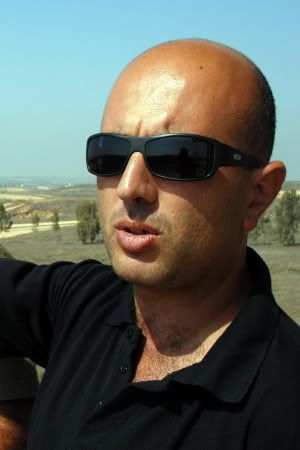
Shika’s friend Zvika
The parking lot was shielded by concrete bomb-blast walls.

A civilian overlook tower was erected next to the military compound. It was not shielded by walls of any kind. But Gaza was still a comfortable distance away. No sniper could possibly shoot us from the other side of the vast and eerily empty no-man’s wasteland that lay between the de-facto end of Israel and the beginning of Gaza.
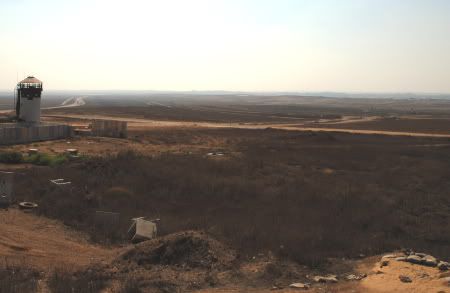
An aerial surveillance balloon flew right over our heads.
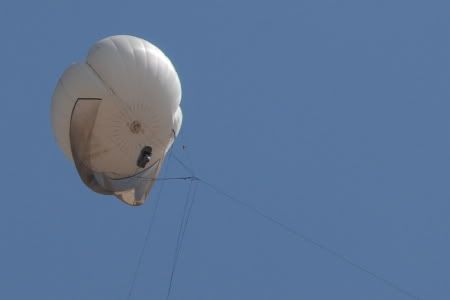
Zvika knew the area well. Shika had asked him to meet us so he could tell me what we were looking at.

“Over there,” Zvika said, “is the town of Beit Hanun.”
Beit Hanun was far, and I had to zoom my camera lens all the way out to take a picture.
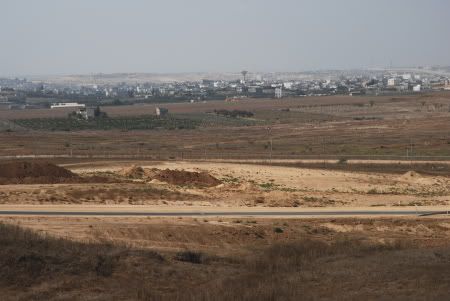
The Gaza city of Beit Hanun from Nir Am with a zoom lens
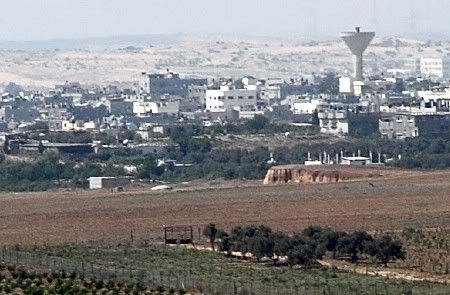
Here is a severely cropped piece from the photo above
“You see those towers off in the distance,” Zvika said. “With the sun shining on them? Those are apartment buildings in Gaza City that Arafat built for members of Fatah.”
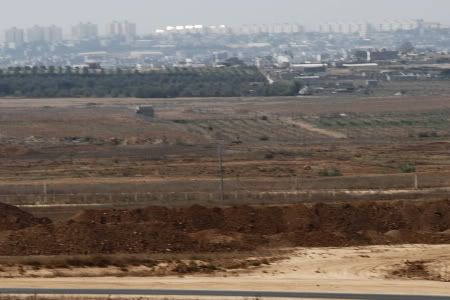
“Where are those smokestacks in the distance off to the right?” I said.
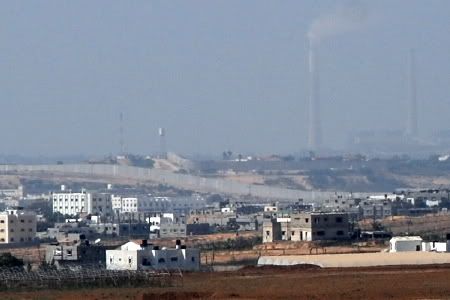
“That’s Ashkelon,” Zvika said. “Islamic Jihad fires Qassam rockets at that city all the time.”
“Is this overlook point always open to the public?” I said. It felt strange just driving up to an IDF base, even if it was just a small one, and hanging out right next to it without having to even say hi to a soldier guarding the road.
“Very few civilians know about this place,” Zvika said. “Only the people who live nearby ever come here.”
“Is this interesting to you?” I said. “Or is it normal?”
“It is normal,” he said.
“It is interesting for me,” Shika said. “It has been three years since I saw anything like this.”
“There used to be plantations just on the other side of the fence,” Zvika said. “But the IDF uprooted them because Qassams were being launched from there. Now they have to fire Qassams from the buildings farther away.”
“If they fire a rocket you will see it,” Shika said.
“Will we see a trail of smoke?” I said.
“Oh yes,” Zvika said and raised his eyebrows. “You will see the smoke.”
Just then several IDF soldiers in the base below shouted something in Hebrew and ran to one of the tanks.
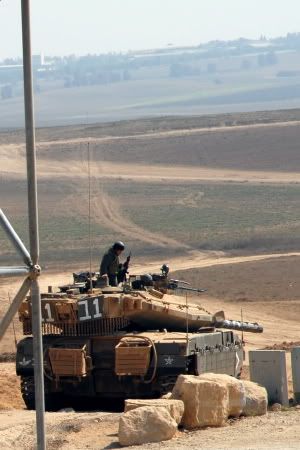
Several men jumped in, cranked up the tank’s engine, and roared with surprising speed into the field toward Gaza in front of the overlook tower.
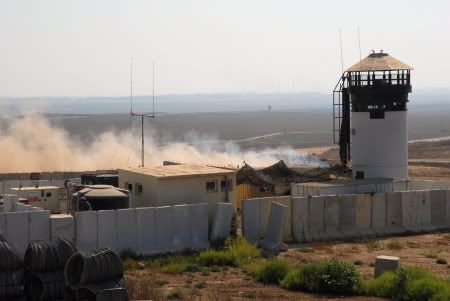
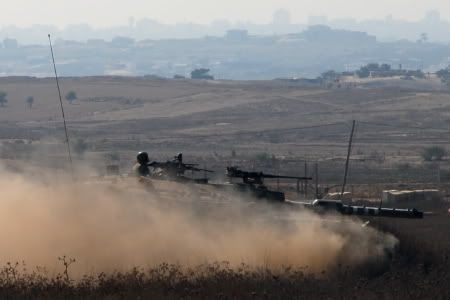

I braced myself for the thunderous racket of combat or a possible incoming or over flying Qassam. Nothing happened. The Gaza area was tense and sporadically violent, but the conflict was significantly dialed down compared with the just-ended open war against Hezbollah in the north.
It was time to move on. Shika and Zvika had much more to show me.
Zvika hopped in his van. Shika and I climbed into the truck and followed Zvika as he drove south down the length of the Gaza Strip.
“You see that dirt road on the other side of the trees next to this one?” Shika said.
I did, and I took a picture of it.
![]()
“Every day a machine goes over it and smoothes it out,” he said. “Trackers, mostly Bedouin, search the dirt every day for fresh footprints. They can tell when someone has come out of Gaza and which direction he’s going. If you put one foot on that road right now you will be arrested.”
“I’m partly relieved that I can’t go into Gaza right now,” I said. I’m being prevented from going into Gaza for a variety of security, logistical, and bureaucratic reasons beyond my control. “But I also partly wish that I could.”
“The beach in Gaza is amazing,” Shika had told me earlier. “It is virgin. You wouldn’t believe it.”
“You’ve been there?” I said.
“Of course,” he said. “We used to go there and eat in the restaurants.”
“When?” I said.
“In the early 80s,” he said.
“It was friendly then?” I said.
“Yeah,” he said. “Israel ruled there. The Palestinians were friendly, I think they miss that period. They had money, they could walk freely.”
We continued following Zvika in his van to the abandoned Karni Terminal.
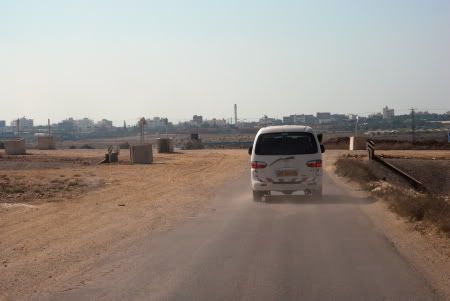
“That’s Gaza, man,” Shika said. “Do you want to go inside?”
“Yes and no,” I said. “Not without the army, though. If you and I go in there right now, we’re both in trouble.”
“Me more than you,” Shika said.
We were much closer to Gaza this time than we were at the overlook tower. Buildings inside the strip loomed just over the tops of concrete bomb-blast and sniper-fire walls.
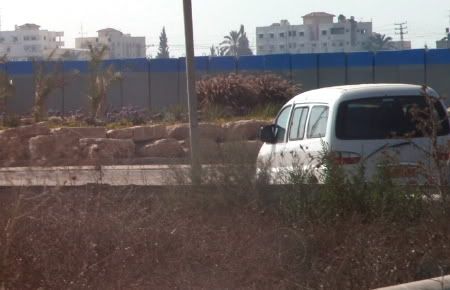
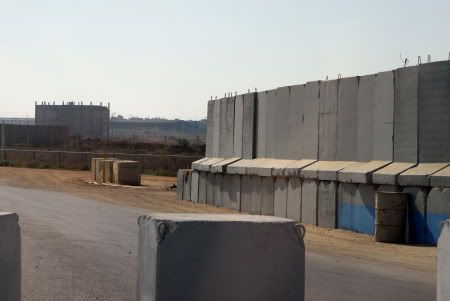
“We are probably over some tunnels right now,” Shika said. “It is very dangerous and we have to be careful.”
The Karni Terminal was a major crossing point for people and goods into and out of Gaza before the place went completely to hell. Today it is abandoned.
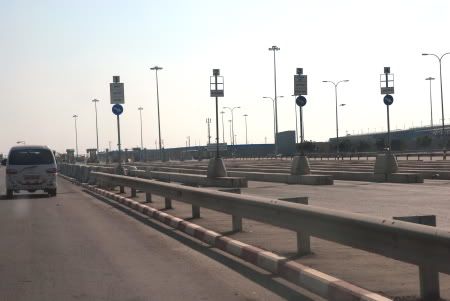
The spooky silence and emptiness only hinted at the violence and anarchy being walled off on the other side after the Israeli withdrawal.
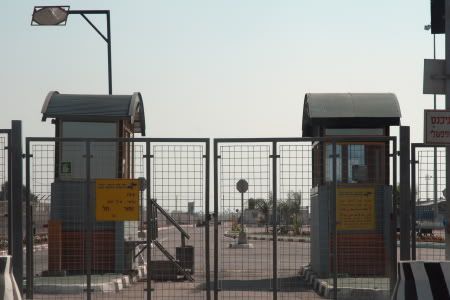
It wasn’t a safe place to linger. So we moved along and headed further south without getting out of our vehicles.
“The last three prime ministers want peace,” Shika said. “They go out of Lebanon, they go out of Gaza. And look what [Arab terrorists] continue to do.”
“Do you think it was right to leave Gaza?” I said.
“Yeah,” he said. “Of course.”
“Even though there are rocket attacks?” I said.
“Yeah,” he said. “This is occupied land. They always have excuses to do what they do. Do you know what’s going on in Gaza now?”
“No,” I said. “I don’t.”
“Whew,” he said. “You can’t imagine.”
“What do you know about it?” I said.
“Everybody has weapons,” he said. “The strongest is the ruler. It is not like in Ramallah.”
Smoke rose from Gaza off to the right.
“You see that fire?” Shika said. “It is from missiles. Israel is shooting at where the terrorists hide.”
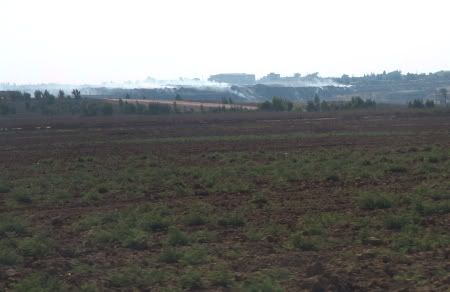
Vicious dogs chased the truck and ran right alongside it, furiously barking, snarling, and threatening to lunge at us.
The only thing less dodgy about this environment than the war zone on the northern border is that I couldn’t hear or see live explosions.
I did, however, see a tank moving fast among some trees.
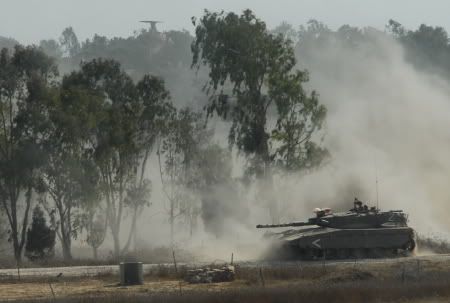
Once again I braced myself for the unspeakably loud explosions of combat. Once again, though, the IDF just seemed to be moving its forces around. There was no fighting at that particular time on that particular day.
We kept driving and passed by more tanks.
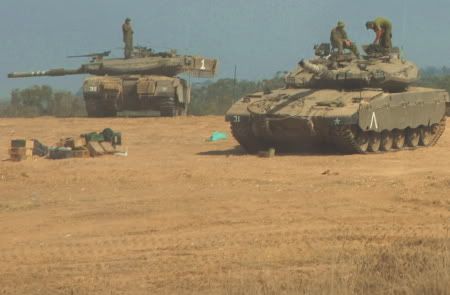
“They are getting ready to go into Gaza,” Shika said.
Some of the tanks looked idle, though. Notice in the photo below that a cover of some sort has been placed over the barrel.
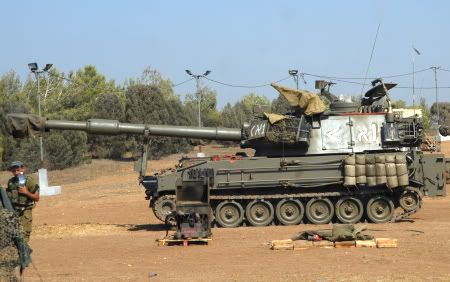
“Roll down the window,” I said. “I want to talk to these guys.”
Shika rolled down the window and shouted at an IDF officer. The officer shouted back.
“I told him you are a journalist,” Shika said. “And he said It’s about time you got down here.”
“Ask him if I can interview some of the soldiers,” I said.
Shika asked my question in Hebrew.
“No,” the officer said.
“Can I take pictures?” I said and held up my camera.
“No,” the officer said. Then why did he say It’s about time you got down here? He didn’t send us away, but he didn’t exactly roll out the welcome wagon.
It was okay, though. Noah Pollak and I were already wrapping up the week-long process of securing interviews with IDF soldiers and military intelligence officers out of Gaza. We had plans to get that side of the story soon enough from people who know who we are and are willing to talk.
You can drive from Tel Aviv to Gaza in an hour. How strange, then, that there’s a little war down there that no one else in Israel — not even the foreign correspondents — have any interest in or are really even aware of. I felt like I had slid off the edge of the country and through a hole in the dimension into a violent alternate reality. It’s as if the Gaza war does not exist in Israel now even though it’s right down the road.
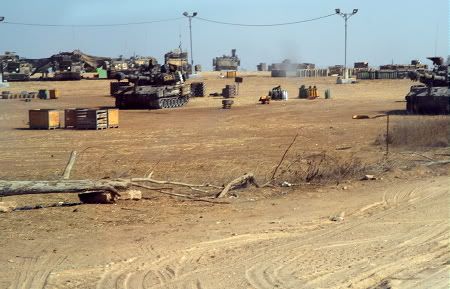
If a terrorist army fired rockets into Jersey City and the US military deployed tanks and heavy artillery against them, those who live in New York would take a keen interest in the goings-on. So would, I suspect, the people of Britain, France, Israel (!), and Cairo.
People get used to war, though. So do countries. Arabs are firing rockets at Jews? Israelis are sending tanks after their hides? Yeah, well, what else is new. Right?
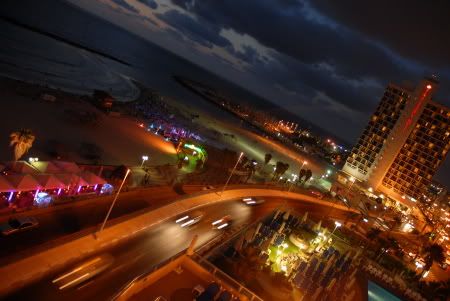
It’s tourist season now, just one hour north. And the beach is calling.
Part II: Israel’s Other Rocket War
SOUTHERN ISRAEL, NEAR GAZA — Israel’s other war-without-a-name in the summer of 2006 is eerily similar to the one in the north, the one that got all the attention, against Iran’s proxy militia Hezbollah in Southern Lebanon.
Palestinian terrorists kidnapped the young Israeli soldier Gilad Shalit just across the border from Gaza and ramped up their Qassam rocket attacks against civilian targets in Israel.
Shika Frista and his friend Zvika took me to Kibbutz Alumim, where Zvika lives with his family, and showed me some of the rockets that landed in and around the community recently.

Several Qassam rockets had been placed beneath a palm tree.

Oddly, the Gaza rocket factory took the trouble to brand their weapons in English.

Elsewhere exploded Qassam rockets and parts were used as garden art.


There is something slightly creepy about using Qassam rockets as garden art. But Qassams are a part of life in Southern Israel. And there’s something slightly defiant as well as creepy about integrating them into the landscape.
Turning a murderous instrument with your name on it into a community showpiece is a way of taking ownership of it, laughing at it even. Your rockets don’t scare us. They’re just garden art now. We’re still here. And you keep missing the target.
Zvika did seem to think the rocket parts were a little bit funny. He held them up for my camera with the same good cheer as a fisherman who just caught a seven pound bass.


I, too, picked up some of the rockets, thinking while doing so that thugs from Hamas or Islamic Jihad had handled them before I did, hoping against the odds that they could use them to kill a few Jews.


Unlike Northern Israel during the Hezbollah war, Southern Israel has not been evacuated. Rockets flying out of Gaza are fewer and smaller than those that were shot out of Lebanon. Terrorism usually doesn’t work as well as its practitioners wish. So far the only thing terrorists in Gaza have accomplished is bringing about the return of the Israeli Defense Forces.
I saw a huge pile of busted up pavement next to one of the streets. “What’s that?” I said to Zvika.

“It is from a Qassam,” he said. “It landed right next to these houses and shattered the road.”

“The houses look okay,” I said. But I remembered the damage I saw from Katyusha attacks by Hezbollah in Kiryat Shmona. Most of the damage done to buildings is cosmetic and easily fixable even while Katyushas are extraordinarily dangerous to human beings.
“If the Qassam lands next to you,” Zvika said, “it will kill you. But it if lands ten meters away it won’t kill you. Qassams are lightweight. If they had more explosives and weighed more the rockets wouldn’t go very far. They would land on the Palestinians.” He laughed and made a diving gesture with his hand. “The rockets are made in Gaza. Islamic Jihad and Hamas are not technologically sophisticated like the Hezbollah.”
If Katyusha rockets are pipsqueakers compared with IAF missiles, Qassams are practically spit balls compared with Katyushas. Then again, a Qassam is huge compared with a bullet, and a great deal more dangerous. They have only killed a handful of people, even so. The biggest danger from the Palestinian rocket war against Israel isn’t the damage Hamas and Islamic Jihad are able to inflict today. It’s the damage they could inflict tomorrow if they find a way to equip themselves with more powerful missiles that could render Southern and even Central Israel uninhabitable.
Zvika pointed to the alarm system on top of the roof of a school.

“You have twenty or thirty seconds after you hear that alarm to get to a shelter,” he said. “It scares the children every time it goes off.”

“Do they ever fire rockets at night?” I said. Hezbollah hardly ever fired Katyusha rockets at night because they did not want to give away the positions of the launchers to the Israeli military.
“Oh yes,” he said. “All day, all night, all the time.”
*
Earlier we had coffee at an outdoor café just far enough away from Gaza that we couldn’t quite see it.

Zvika’s two children joined us.


They had accompanied us during our entire tour along the border with Gaza, which just goes to show how normal-seeming such places can be when you live near them. I doubt many tourists ever take their kids to that border.
A Qassam could have struck us at any moment, although the odds were low enough that I didn’t worry about it. I even tried to worry about it just so I would have an idea what it can feel like to live next to Gaza. After spending a day and a half under fire from Hezbollah, though, Qassams didn’t seem like that big a deal.
Just as we were sitting there drinking our coffee, Zvika received a text message on his cell phone telling us that an incoming rocket struck Kibbutz Kissufim.
“That happened just now?” I said.
“Just now,” Zvika said.
It was far enough away that we didn’t hear it.
I wanted to know what Zvika thought about Israel’s withdrawal from Gaza last year now that he has to live under rocket fire in part as a result. Was withdrawing the settlements and the army the right thing to do?
“Yes,” Zvika said. But he does not want to withdraw from the West Bank. “It is our land. They can have Gaza. But Hebron has always been ours. They have only been there for 200 years.”
The United States has barely existed for more than 200 years. No one thinks non-native Americans should have to pack up and go back to Europe or wherever else their families came from. At some point the statute of limitations has to run out on these things. George Santayana famously said those who forget history are doomed to repeat it. P.J. O’Rourke went further and said it goes double for those who can’t remember anything else.
“Do you just want to sit on top of Palestinians forever?” I said to Zvika.
He shrugged.
“What is the solution to this problem?” Shika asked Zvika. Zvika had no answer, not even a bad one.
“What is the solution?” Shika said again. “What do you think is the solution?”
Zvika didn’t say anything.
“You want to keep the West Bank but give them Gaza?” I said.
“We gave them Gaza,” Zvika said, “and Lebanon. But Hamas and Hezbollah still want to kill us. Why? What did we do to Lebanon? Nothing. And they want to kill us!”
“The West Bank is different from Lebanon, though,” I said.
“Yes,” Zvika said. “It is our land.”
Zvika is in the minority. Shika calls him a “fanatic,” even though they are friends. The Israeli center as the well as the left wants out of the West Bank as well as out of Gaza. Ehud Olmert was elected in part on that platform.
There’s an old formula that has been floating around for a while.
1. Greater Israel
2. Democracy
3. Jewish Majority
Pick two.
Zvika and the rest of Israelis to the right of the mainstream still think, somehow, they will find a way to hold onto all three.
It didn’t matter what I said to Zvika. He just kept saying “It is our land,” as if that settled everything and there was nothing left to be said.
*
Shika and I left Zvika at Kibbutz Alumim and continued by ourselves in his truck to Kelem Shalom, where Israel, Gaza, and Egypt converge.

This is where the young Israeli soldier Gilad Shalit was kidnapped on June 25, triggering Operation Summer Rain that continues in Gaza today, almost entirely beyond any media coverage.

Shalit was inside a tank near the tower pictured above. Eight terrorists emerged from an underground tunnel 700 meters long that began in a building in Gaza and ended as a hard-to-see hole in the middle of an Israeli field. They fired an RPG at the tank and killed two soldiers. Gilad Shalit emerged from the tank. The terrorists snatched him off the tank and stole him to Gaza. The whole operation took seven minutes.
Tunnels are appearing all over the place. Tunnels from Gaza into Egypt for smuggling weapons. Tunnels from Gaza into Israel for carrying out terrorist actions.
The Egyptian border patrol (pictured below) does shut down some of the smugglers’ tunnels, even though it is not their top priority.

Tunnels are a top priority for Israel, though, along the border with Egypt as well as underneath their own territory.

Those tunnels get people killed. They keep finding new ones beneath the houses.
Part III: A Volcano of Terror

SOUTHERN ISRAEL, NEAR GAZA – On June 25, 2006, eight armed Palestinian men emerged from an underground tunnel through a hard-to-see hole in the ground, fired an RPG at an Israeli tank, killed two soldiers, snatched another young soldier, Gilad Shalit, and stole him away into Gaza. The attack lasted seven minutes. The Israeli Defense Forces then launched Operation Summer Rain against the kidnappers, against those who fire Qassam rockets at Israeli civilians, and against those who dig tunnels under the earth so they can smuggle weapons out of Egypt and carry out terrorist attacks inside Israel.
Soldiers keep watch on the border at a small military outpost just south of Kibbutz Nir Am.

There I met Major Tal Lev-Ram, Spokesman for the IDF Southern Command. He unfurled an enormous map of Gaza and asked me please not to take any pictures of it. Code names for villages and neighborhoods were hand-written with red ink in Hebrew.

“When we left the Gaza Strip we didn’t think the terrorism would stop,” he said. “We understood that there would no longer be any legitimacy for them to act. A year after they continue to re-arm. The terrorist groups — Fatah, Hamas, Islamic Jihad — they did not turn the areas we left into schools, factories, and so on. They became training camps for the terrorist groups.”
The major knows passable English, but he chose to speak to me in Hebrew through a translator. I had hoped for an interview with an English-speaking officer. But none of the spokesman for the Southern Command are fluent in English. All the English speakers were sent to the Northern Command so they could talk to foreign media during the Lebanon war. Only Israeli journalists who write and broadcast in Hebrew showed much interest in the military confrontation in Gaza.
“We also left the Egypt-Gaza border,” he said. “The Egyptians are responsible for it now. They are doing an okay job, but there is still a lot of smuggling and so on.”
“They’re using tunnels?” I said.
“We found two tunnels just two weeks ago,” he said. “They are very organized, with electricity and everything. One city straddles the border. It’s basically one city on each side. They are digging tunnels to connect them.”
“Do the Egyptians shut down the tunnels?” I said.
“We spend great effort finding and exposing the tunnels,” he said. “The Egyptians make an effort, but it is not the highest priority for them.”
I taped our conversation with a digital voice recorder, as is routine for me lately. A young Israeli soldier took notes by hand at the same time. Perhaps it was her job to make sure I did not misquote the spokesman. Or maybe she was checking on him. It’s hard to say. I didn’t ask her why she recorded everything, and no one in the military ever told me I need to clear my work with any censors.
“We have good defenses on the border fence,” the major said. “Last year more than 70 terrorists were killed trying to breach it. Because the area is very confined, terrorism is brewing. They keep trying to find ways to go outside. It is like a volcano of terror. It needs to go somewhere. They try to go around, out into Egypt, and then over to the Israeli side. Sometimes they try to cross back in right next to Gaza. Other times they go down near Eilat [at the bottom of Israel.]”
Gaza is tiny. It’s 30 or so miles long and only a few miles wide.
“[They try] to go around the border,” he said, “in order to move information, training, and terrorists, and ammunition to their side from the West Bank. They are always trying to find ways to go around the Israeli border. They also fired something like 1,000 Qassam rockets since the disengagement until now. For no reason.”
“How many people have been killed by the Qassams?” I said.
“This year?” he said. “Zero.”
Zero! No wonder the Israelis who live near Gaza haven’t evacuated. Southern Israel at war is not like Northern Israel during Hezbollah’s Katyusha war.
“But terror is terror,” he said. “If you are afraid to send your child to a kindergarten, for me it’s the same. For now it’s the Qassam. In the future they will have more than today. 20 people in the past were killed by the Qassams. And like I said, terror is terror. You feel terror.”
I asked him if he thought the Israeli withdrawal from Gaza was a good idea. He wouldn’t answer and said that his opinion as a military man didn’t matter. The Israeli military takes orders from the democratically elected government, and that’s that.
“One of the major events after the disengagement,” he did say, “was the election of Hamas. They became the government in the Gaza Strip. Their principal goal is to destroy Israel. And they actually commit terror. Israel can’t accept that we left the Gaza Strip and still face daily terror attacks on and over the fence. Around 60 times charges of 50 kilograms were exploded on the fence. Also RPG and M-16 attacks on the fence against our forces. On Passover an attempt was prevented to go into a Kibbutz near the Karni Terminal…The second event that had a significant role in changing the rules of the game was the kidnapping of Gilad Shalit. We came to the decision that we need to take some sort of aggressive action in the Gaza Strip. The decision was to act against specific cells in different places. So we’re not talking about conquering land. We’re talking about operations of a few days each. We’re going in to destroy the infrastructure of terrorists. We can’t finish all the terror. But we can punch against it. During these operations more than 200 terrorists were killed. Weapons storages, training camps, all the infrastructure, factories where they make Qassam rockets.”
“How do you know where the factories are?” I said. “Do you have Palestinians informers?”
“We have good intelligence,” he said and laughed. “We have good military intelligence.”
It’s no secret that many Palestinians cooperate (or “collaborate”) with Israel against terrorists. But I decided to be a good sport and let him deflect the question. He wouldn’t be able to say anything on the record that isn’t already widely known anyway.
“Another pattern that’s unusual,” he said. “They use the civilian population as human shields.” It’s not really unusual. Hezbollah did the same thing in Lebanon. Fighters in Iraq do it there, too, although some in Iraq also deliberately murder Iraqis.
“Does the local population let them do this?” I said.
“It’s a problem,” he said. “Sometimes we see resistance. But it’s difficult to judge from our perspective. We see a lot of cases where Katyusha or Qassam rockets are fired from within populated areas. More than that, they came up with a system that was based on the fear that we would find the exact location of the rocket launchers. So they place the launchers with a timer. And ten, eleven, and twelve year old children come and take the launcher away afterwards. Often we’re faced with fourteen or fifteen year old youth who come, armed, and place charges along the fence. When we see them, even when we see that they are armed, if they are only fourteen or fifteen we only shoot to scare them. We don’t actually fire at them. Of course, only if there is no immediate danger to our forces.
“Our general instructions,” he continued, “not just in the these cases, is if we see a militant who is armed, a terrorist, and there is no immediate danger to our forces, we don’t fire if there is a danger that we would hurt the innocents, people who are not involved. But with that, it’s important to say that when we have such aggressive fighting in populated areas, when there’s an exchange of fire between terrorists and the IDF, there are cases where innocent people get hurt. But we warn as much as we can to step back, step away, to clear the area. So we see the terror organizations as responsible when civilians get hurt. And when there is a case and we know that a civilian was killed by mistake or unnecessarily, we check ourselves. When a rocket is fired and we respond with artillery fire, there could be civilians hurt. We don’t fire into populated areas. Only to the exact spots where they fired Qassams. If it’s in the middle of the city, we will not shoot.”
Sadly it’s impossible to fight terrorists, guerillas, or whatever you want to call them, in populated areas without hurting civilians. No one has yet invented the Bad Guy Bullet that flies safely past innocents and hits only the armed. The fact that Palestinian terrorists, like those everywhere else in the Middle East, make blending in with the civilian population part of their modus operandi means civilian casualties are unavoidable in a fight. It doesn’t help that Gaza is one of the most densely populated places on earth.
“About a month and a half ago,” he said, “another event that shows you the dilemma here: Two terrorists with an RPG tried to shoot a tank. We shot back. In the same house the mother of them, and a cousin, were in the same house. They fired five meters away from where the mother and cousin were standing. The Palestinian headline said that a mother and child were killed. The child was twenty two years old. And he was a member of Hamas. So, I am not happy about the mother. But, this is my right. You know? In the houses of Hamas militants, and all the other terrorist organizations, there are storages of weaponry. That’s because in the past we would avoid attacking houses with families. Which raises the question: Sometimes we as the IDF care more about the families and the children than he who would put them in danger. In a house, let’s say of three floors, a whole floor may be used as a storage.”
A tunnel had recently been found near the Karni terminal where goods and materials cross from Israel into Gaza. I asked if I could see it.
“I will take you to Karni,” he said. “But you cannot see the tunnel. It is inside the Palestinian territory. One kilometer inside. You understand? It is one kilometer inside the Palestinian territory.” In other words, the tunnel diggers are determined. They will spend Lord only knows how many hours digging and digging and digging, knowing most tunnels are discovered before they’re completed, just on the off chance that they’ll make it all the way into Israel and get to maybe kill one or two people.
“One more thing I want to say,” he said. “We will not stop the military action until Gilad Shalit comes back to us. But — and I say this to the press all the time — if there will be silence on our side for our villages it will be quiet on the Palestinian side.”
“How many soldiers have been killed since Gilad Shalit was kidnapped?” I said.
“All the year, before Gilad Shalit, no one. In the Shalit event, two soldiers died. And after that one more soldier died from friendly shooting. That’s all. So this is the big question for them. The spokesman of the government for Palestinians three days ago said the same thing I say all the time. For what? For what? For three soldiers who were killed in Gaza. In all the year something like 500 terrorists died in Gaza. So for what? The organizations of terror need to understand that it’s not worth it for them. And they can choose. We left the territory in the Gaza Strip, so it’s up to them. We will not stop the Qassam only with military pressure. They need to decide that they want to stop it. And if they will stop the Qassams, if they will stop the terror, free Gilad Shalit, we won’t have anything to fight about. And Karni will be open more. And everything will be better for them, not for us. This is the question. This is the biggest question, I think. And if you have time to read what the spokesman for Hamas government said, I think he can replace me.” He laughed. “Yeah? This is the truth. He is a good man.”
And he laughed again. Not because he was joking, but because it truly is an alternate Middle Eastern universe when the spokesman for Hamas echoes precisely the views of the spokesman for the IDF Southern Command.
Skeptical? Read for yourself. Hamas Spokesman Ghazi Hamad comes across like a world-weary man ground down and plainly despondent from a largely self-imposed Palestinian catastrophe.
I had a faint hope after Hamas was elected that the reality check from hell might finally kick in. And at least in one case, and for one day, it did.
*
The major drove to an area near the Karni Terminal in his jeep.

I followed behind him in my rental car. He took us straight into a dirt field. I nearly took the muffler off my poor little Hundai when I drove over a basketball-sized dirt clod as hard as a rock. We stepped out into the open where there was no shade from the fierce Levantine sun at the end of the summer. Distant machine gun fire was almost, but not quite, drowned out in the wind.
“Kalashnikov,” said my translator who, like many Israelis, can identify weapons by sound.
A large truck-mounted surveillance camera monitored Gaza just to our left.

“Two days ago was Gilad Shalit’s birthday,” said the major. “One soldier from his unit said he was glad to be in Gaza fighting the people who took him. His family and friends released hundreds of balloons into the air from the place where he was kidnapped.”
I wanted to know about that tunnel the IDF found.
“The plan was to use it for suicide bombings at Karni,” he said. “I can’t understand it. Karni is their lifeline, their life. This is the biggest reason we closed it. It’s hard to understand why they keep doing these things at the crossing points unless they are trying to make life harder in Gaza.”
Two months ago Palestinian police stopped a car bomber heading toward Karni. Six months ago the IDF stopped three terrorists with M-16s, grenades, and suicide bomb belts at the Erez crossing point where people, rather than goods, transit into and out of Gaza.
“We think there are many many more tunnels,” the major said. “The Kelem Shalom action [where Gilad Shalit was kidnapped] was through a 700 meter-long tunnel. We can’t just stay here and wait for the tunnels to come to us. In a few hours we will bomb that one we just found.”
And bomb it they did, from below. Click here to watch the video.
“How many Qassam rockets are they firing now?” I said. I saw more than a dozen Katyushas fired from Hezbollah in the north, but I did not see a single Qassam fired from Gaza.
“Sixty per week at the start of Operation Summer Rain,” he said. “Ever since the number has been going down. Now there are only five per week. Hamas has partly put a stop to this because they know terror does not work for them.”
“How good are the fighters in Gaza compared with the Hezbollah fighters in Lebanon?” I said.
“I don’t mean to dismiss anyone,” he said. “Some fights are serious here. But you can’t compare them with Hezbollah. Hezbollah has more weapons and uses more guerilla activity. Hamas doesn’t have big rockets yet. Yet. The word yet is very important. Hezbollah also is more organized. You shouldn’t underestimate anyone. We had some people wounded in the fight here. Some in Gaza fight very good. But we killed hundreds of terrorists since Summer Rain. We had only one soldier killed in friendly fire, and ten to twelve wounded.”
“How long until this fight is over?” I said. I meant the current fighting in Gaza, but he seemed to have thought I meant the Arab-Israeli conflict in general.
“I don’t see the end now,” he said. “Maybe this part will be soon be finished. Shalit will be back. For a while it will be quiet. The question, you know, is for the other side. Because we went out of Gaza and then it started. If they get more democratic and reduce the chaos…that’s my hope. We need to be strong and give a chance for something else. It’s in the interest of the Palestinian side now to have another life.”
We left the field and drove straight to the fence. I wanted to get as close to Gaza as possible. We parked next to large concrete wall placed there for protection.
“So this wall,” I said. “Is it to protect us from snipers or from rockets?
“From everything,” the major said. Barriers of all kinds are erected near the Palestinian territories. One road I took next to the West Bank was shielded on one side by bullet-proof glass because some Palestinians like to randomly shoot rifles at cars.
The fenced border between Israel and Gaza was right in front of us. The fence is electric. It won’t shock you if you touch it. But it will send a signal to the Israeli military telling them where contact was made so they can dispatch soldiers to that location.
“What would you do,” I said, “if you saw somebody from the other side walk up and stand right there?”

“Eh, it depends,” he said.
“It depends on what he’s doing?” I said.
“Of course.”
“If he’s just standing there it’s not a problem?” I said.
“No, it’s a problem,” he said. “Because sometimes they come like a citizen and they put charges there. If it’s in the day and we see a man, the soldiers come. If someone goes to the fence he has some reason. If we see some people come in the night we have a procedure. We start by shouting to them to go. But if they continue…okay? If it’s in the night, well you know, night is night. The thing is to make them understand not to come. Sometimes Palestinians come and want to go into Israel to work. They want to come into Israel not for military action but to come inside for working. But it is very complicated, especially in the night, to know who is the person.”
“How many people who come to the fence aren’t here to fight?” I said.
“Here is a sad story,” he said. “One Palestinian went to the fence with a grenade. Not a militant. He came to the fence and we did not understand it. Because we told him to stop and he dropped it and everything was okay. Sometimes they want to be in the Israeli jail.”
“To get out of Gaza?” I said.
“Because maybe the food in the jail is better,” he said. “I don’t know. It’s a few, it’s not, you know, all the time.”
Gaza itself is often described as a prison. The reason I didn’t go in there myself is because I was briefly affiliated with Time magazine and they ordered me to stay out. They had neither the time nor the inclination to take out a war insurance policy on me. But a Danish journalist I know, Louis Stigsgaard Nissen, did get a brief tour of Gaza and she described it as an absolute horror, a far worse place than the West Bank which both of us had visited in the past.
Trash has not been collected for months, so much of Gaza City looks like a garbage dump that happens to have buildings inside it. The garbage is seeping now into the water. Israeli doctors are returning because the Palestinians desperately need medical help. She interviewed a man who lives in a sports stadium with his children. She was nearly run over in the street by a truck driven by gunmen and bristling with weapons.

“Is anyone really in charge inside Gaza?” I asked the major.
“That is the question,” he said. “They have a government, but there is a power struggle among the armed groups.”
Once again we heard rapid machine gun fire in the middle distance. He and I stood right next to the concrete wall and could have taken cover. But the shooting had nothing to do with us and sounded just barely far enough away. So we didn’t move. It’s funny what you get used to. I’ve never been in the army, and I’m unaccustomed to being in war zones. But it doesn’t take long to get used to it.
“We have a connection with the Palestinian police and with the army,” he said. “For example if we found some charges that they put on their side of the second fence the Palestinian police come to take it or to boom it. In the operations today because of the army, and the pressure, and the militants, there was a fire between us and the Palestinians next to a place where gasoline was stored and also some baby chickens, you know, the little ones. And we talked with the Palestinian police and they brought some trucks in to take them out. We saved them from the RPGs.”
He spoke in English now instead of through a translator, and I wasn’t sure I understood.
“So the Israeli side and the Palestinian side cooperated in the middle of a war to save baby chickens?” I said. “And then started fighting again?”
“Not exactly,” he said. “If you see the story as a simple one, yes. But the ones we talked with were not the ones shooting the RPGs. So it’s a very complicated story. But we talked with the police and the citizens talk with the army to help them. We told the citizens: Not now. It’s dangerous. The militants are firing RPGs.

“It is very strange,” he continued. “But it is our world. It is us against them, but they are divided inside. This is the story of Gaza.”
Post-script: Please hit the Pay Pal button and help pay travel expenses for independent writing. I am not a rich person, and I can’t do this without help. I want to do more of this in the future, and I’m working on getting myself to Baghdad as soon as possible.
[paypal_tipjar /]
If you would like to donate money for travel expenses and you don’t want to use Pay Pal, you can send a check or money order to:
Michael Totten
P.O. Box 312
Portland, OR 97207-0312
Many thanks in advance.
All photos copyright Michael J. Totten










Join the conversation as a VIP Member